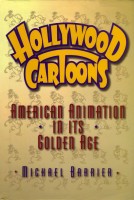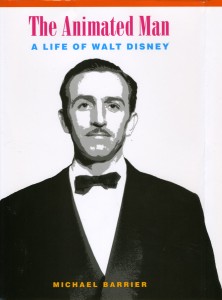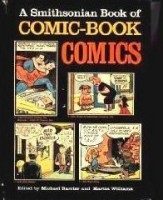Articles on Animation &Books &Commentary 19 Jun 2010 09:05 am
Happy belated Birthday, Mike
 - This past Tuesday, Amid Amidi celebrated the birthday of Mike Barrier with a very respectful commentary on Cartoon Brew. This was followed quickly by more kind words and an acutely written article on Mark Mayerson’s excellent blog. Both were met with positive comments from the people following the two sites.
- This past Tuesday, Amid Amidi celebrated the birthday of Mike Barrier with a very respectful commentary on Cartoon Brew. This was followed quickly by more kind words and an acutely written article on Mark Mayerson’s excellent blog. Both were met with positive comments from the people following the two sites.
I was pleased to see both posts and thought of leaving my own comment on each of them. However, I have my own blog and have probably too much to say.
Mike and Phyllis Barrier are very dear friends to me. When they lived in Washington D.C. I took many weekend trips to see some art exhibit or special film event or just a visit to meet with them. We grew close, and even though now we’re half a continent away, I still feel there’s something dear and special about our friendship.
However, long before we became friends, I was a fan of Mike’s writing, criticism and commentaries about the world of animation. Those early issues of Funnyworld Magazine became seminal to my knowledge about the history of the medium. I also knew inherently that this was a widespread thing. Anyone who was anyone, student or professional, knew the magazine. I remember going to my first animation festival – Ottawa ’76. I witnessed no fewer than three conversations about Chuck Jones vs Bob Clampett, all precipitated by a couple of pieces in Funnyworld. No matter how ludicrous it all seems now, Mike had inadvertently reignited something of a feud in Hollywood between the two directors even though he wrote that Jones and Clampett were both brilliant.
The magazine made a large foothold among all animation-lovers. Eventually, it, like most small and independently published magazines, suffered financially until it had to be stopped. Back issues are still being sold for enormous amounts of money.
 Mike kept pushing ahead for years and years and years on his book, a history of Hollywood animation and it was always a treat for me to discuss it with him. Like many other people, I panted for the day when the book would finally make it to the stores. Once Hollywood Cartoons: American Animation in Its Golden Age was published, I immediately plowed through it, then started over and read it again. I’ve re-read the book every year since. It’s the pinnacle of animation history, in my opinion. There’s nothing as exacting or precise or historically accurate on the market.
Mike kept pushing ahead for years and years and years on his book, a history of Hollywood animation and it was always a treat for me to discuss it with him. Like many other people, I panted for the day when the book would finally make it to the stores. Once Hollywood Cartoons: American Animation in Its Golden Age was published, I immediately plowed through it, then started over and read it again. I’ve re-read the book every year since. It’s the pinnacle of animation history, in my opinion. There’s nothing as exacting or precise or historically accurate on the market.
I also remember a point when Mike was hired to write a history of Warner Brothers cartoons. During one visit to his home in Alexandria, he surprised me by handing me the manuscript and asking me to read it. That was one of the fastest reads I’ve gone through. Excellent, of course; I was properly overwhelmed. On another day, he opened a draw of large-sized chromes of WB artwork. BG’s and animation drawings photographed beautifully and sitting there for me to drool over. It was a treasure-filled weekend for me. The book was cancelled by Warners when they suddenly had a power shift, and a piece of brilliant historical writing was lost. I’ve always hoped Mike would somehow rework that manuscript so that the ultimate history of WB would be made public.
 The Animated Man: A Life of Walt Disney, is equally brilliant, even though it seemed to disappoint some animation people. The book follows the story of Walt Disney, the man – just as the title states. It took its subject seriously, and when Walt lost interest in animation, so did the book. We learned more about Fess Parker, Treasure Island and the theme parks than we ever expected from a book about Disney. And, realistically, that’s the way it should have been. Mike painted a portrait of a unique man, and it made him human. Something that hadn’t been attempted before – except by some detractors who tried to make their names by slandering Walt and finding the most negative stories they could concoct.
The Animated Man: A Life of Walt Disney, is equally brilliant, even though it seemed to disappoint some animation people. The book follows the story of Walt Disney, the man – just as the title states. It took its subject seriously, and when Walt lost interest in animation, so did the book. We learned more about Fess Parker, Treasure Island and the theme parks than we ever expected from a book about Disney. And, realistically, that’s the way it should have been. Mike painted a portrait of a unique man, and it made him human. Something that hadn’t been attempted before – except by some detractors who tried to make their names by slandering Walt and finding the most negative stories they could concoct.
 Aside from these two books, Mike wrote Carl Barks and the Art of the Comic Book, a history of Barks and the amazing comic books he wrote and illustrated for Disney. Mike has also coauthored, with Martin Williams, The Smithsonian Book of Comic Book Comics, a complete history of the comic page characters that developed into long-running comic books. It’s a big book with lots of well-produced color comic pages. The comic pages are printed on the same newsprint that the originals were printed on.
Aside from these two books, Mike wrote Carl Barks and the Art of the Comic Book, a history of Barks and the amazing comic books he wrote and illustrated for Disney. Mike has also coauthored, with Martin Williams, The Smithsonian Book of Comic Book Comics, a complete history of the comic page characters that developed into long-running comic books. It’s a big book with lots of well-produced color comic pages. The comic pages are printed on the same newsprint that the originals were printed on.
Oh, yes, he also has a great website.
Now, Mike has turned 70 and seems to be in high form. I know he’s working on a couple of other books and I anxiously await getting them in my hands. Mike’s a friend, a good friend. Aside from that he’s a great and knowledgeable writer of animation. Even when I don’t agree with what he has to say, his writing makes me think about my medium and pushes me to think deeper. (A good example of this is his review of Get To Know Your Dragon which pointed out that we’ve lost something since the glorious Fanny trilogmade in the early thirties. It got me to think seriously about how to bring back that slower paced aura from the past, the one that allowed characters to develop – really develop. Not in the clichéd way of today’s animation but in the full and deep way of the films of the golden era.)
Many like to put down Mike’s writing for being too negative. I know it isn’t. I know that most other writing is too accepting, too forgiving. Has there been a serious review of Toy Story 3? I only see glowing reviews for an amazingly clever film that whisks us through a hurly-burly of confusion until the sappy moments at the end. No characters properly developed, or enlarged. Just whirlwind story – very cleverly done. We need better film critics, not just animation critics. Ironman II isn’t ok, nor is The A Team, nor is Shrek 4. They’re franchises not movies. MacDonald’s III. Yes, aspects of them all are fun, but that’s not enough. We need good movies that are better than clever, and we need more reviewers like Mike Barrier. Those whose historical accuracy is above and beyond most others and whose taste is shaped by a history of watching many many films as well as by a strong understanding of the medium. He knows what he’s writing about, is not afraid to say it, and I’ll follow him anywhere.
Happy Birthday, Mike Barrier, may you have many more.

on 19 Jun 2010 at 11:35 am 1.Neal said …
Barrier is a contrarian, and is not as well “researched” as some people would like you to believe. He truly must not enjoy his life very much living in such thinly veiled and insular bitterness. And he’s not particularly friendly, either. One good thing is that he’ll never die. He’ll just harden.
on 19 Jun 2010 at 11:46 am 2.Michael said …
Your knowledge of animation and animation history must be limited to call Mike Barrier less than the best researched historian in the field. There is not one of the most respected historians who would disagree with that. Sorry. Just because you don’t like his reviews, doesn’t mean that he doesn’t know the history.
on 19 Jun 2010 at 11:50 am 3.David Nethery said …
Well said.
I missed commenting on the posts from last week by Amid Amidi and Mark Mayerson, but I would heartily concur with those as well.
Happy (belated) Birthday wishes to Mr. Barrier. May he publish many more books.
“Even when I don’t agree with what he has to say, his writing makes me think about my medium and pushes me to think deeper. “
This is such an important point about why Barrier’s style of writing about animation is more important than ever.
What is frustrating to me about many of Barrier’s detractors is that they fail to see that even if they disagree with him on his assessment of a particular film or a director , that he has given them something substantial to chew on. A lot of these people (many of them very young) are looking for a guru to tell them what to think and what to say , not for an intellect to challenge their thinking and open them up to a point of view they may not have considered.
on 19 Jun 2010 at 1:50 pm 4.Eric Noble said …
Very good post. I have a copy of [I]A Smithsonian Book of Comic Book Comics[/I] and I hope to get his other books too. He really does inspire me to look at animation in a far more critical way than before. Actually, the two of you have inspired me to look into the [I]Fanny[/I] trilogy.
BTW, I was wondering what you thought of Ralph Bakshi’s work. I always like hearing others opinions about such things. It challenges me to look at things in a new way.
on 19 Jun 2010 at 2:59 pm 5.Michael said …
Eric, I’m sort of a lover/hater of Bakshi’s work. In the 70′s and 80′s when he was churning out all that work, his films really attacked the establishment’s children based films. He really got animation to grow up (at least to a 16 year old level.) The films, themselves, were always sloppy and stole from the best of them, but they had a raw strength you couldn’t argue with.
He inspired a lot of really talented people, and it took a long time for that talent to bloom outside of Bakshi’s films. You have to give him a lot of credit.
on 20 Jun 2010 at 12:10 pm 6.Cameron said …
I’m curious as to why you’re so bent out of shape over those movies at the end. Toy Story 3 was the only one to cause much critical hooplah, and even Ironman II’s reviews were merely acceptable. Shrek 4 and The A-Team received fairly mediocre write-ups. What’s the problem?
I will wish Mr. Barrier the best, but still consider him a much better historian than a critic. His opinions are well informed, but narrow, and I have never found a use for any of his reviews. Good critics, to me, seek out films of varying styles and traditions well outside the mainstream and are able to bring attention to and compare them with better known work. They’re also able to instill a philosophical element that personalizes their reviews and biases. Jonathan Rosenbaum and J. Hoberman do this with live-action, as did Robin Wood and Andre Bazin. Andrew Sarris still does this to a point, though he’s far from what he once was.
Who does this in animation? Michael Barrier has never demonstrated this to me. The best I’ve found is references to old films like Mrs. Miniver, (the connection between this and WALL-E continues to elude me) and heaps of dull traditionalism. With the utmost respect toward his accomplishments, I must consider him in a manner similar to Pauline Kael: as someone who’s accomplished some great things, but whose actual opinions have little effect on me and, frankly, don’t inspire much real thought for me.
For the record, the only critic of animation I read especially regularly is Benjamin Ettinger, whose thirst for animation outside the mainstream and little exposed animators introduced me to great artists like Tomonori Kogawa and Eichii Yamamoto. If only there were more critics like him, but could elaborate on certain aspects and areas of animation like he does on individual style in Japanese animation, I would be more open to animation criticism.
But that’s so rare even in live action criticism. And, to his credit, Barrier is far more informed and eloquent than any popular critic I can think of.
on 20 Jun 2010 at 7:08 pm 7.Michael said …
The problem, Cameron, is that all those movies are mediocre to poor films, yet the film critics praise them highly enough. Toy Story 3, despite the over praise of all the critics, is not the answer to greatness in animation. Having just seen the film the night before writing the article, I lashed out. With good reason.
As for Mike Barrier, he’s THE foremost historian. If you don’t like his criticism you don’t have to read it. It’s your opinion against his. I like his opinion, often, though I don’t always agree with him.
on 20 Jun 2010 at 10:13 pm 8.Thad said …
I agree with David Nethery’s hypothesis about M.B.’s detractors because I definitely experienced that kind of mindset. Hollywood Cartoons may be my favorite book on classical animation, though I would consider it near perfect without the Fleischer chapters, which read as dead weight or if he’s only writing about them because you’re expected to cover the Fleischers in a golden age cartoon history.
What galls people the most really is that a lot of what Mike writes is articulated very well, and most of it makes sense. That’s too much for most animation fans and professionals (sorry, it’s true).
on 21 Jun 2010 at 10:22 am 9.fishmorgjp said …
It’s the old problem of dealing with mass mind and mass media; the mass media, the entertainment franchises satisfy some people, and they don’t ask for anything better. Anybody who presumes to attempt thoughtful analysis, or even to voice a variant opinion, is labeled as mean or sour or fussy.
on 21 Jun 2010 at 10:24 am 10.Artie said …
The thing I like about Michael Barrier is that he freely offers opinions on animation without worrying about offending those in power at the studios. He’s no suck up.
on 21 Jun 2010 at 1:08 pm 11.Thad said …
The thing I like about Michael Barrier is that he freely offers opinions on animation without worrying about offending those in power at the studios. He’s no suck up.
Because he made the wise choice of not relying on those studios for income.
on 21 Jun 2010 at 1:57 pm 12.Artie said …
True Thad. But my point is more that many critics/historians feel they have to “play nice” with studio connections in order to retain access to reference material and inside information.
on 16 Mar 2013 at 10:20 pm 13.Joey P. said …
While I think that a lot of the praise for Toy Story 3 comes from people genuinely enjoying it, even having thought about it (I don’t think there’s much of a case for it being objectively bad in a way that most critics just can’t see), Barrier’s review was not only valid but well-written. I often don’t enjoy his reviews as much as his essays, but he’s a brilliant writer and historian. His articles leave me feeling enriched.
on 12 Oct 2013 at 7:54 am 14.Arizona Diamondbacks Jerseys said …
If all your family members get some of these game day cycling tops at a multi function normal store or otherwise back and forth from going to be the official lead capture page about an NFL team,all your family memberscheapjerseysaleonline2013comment may or may not invest some time if that is so above $100.